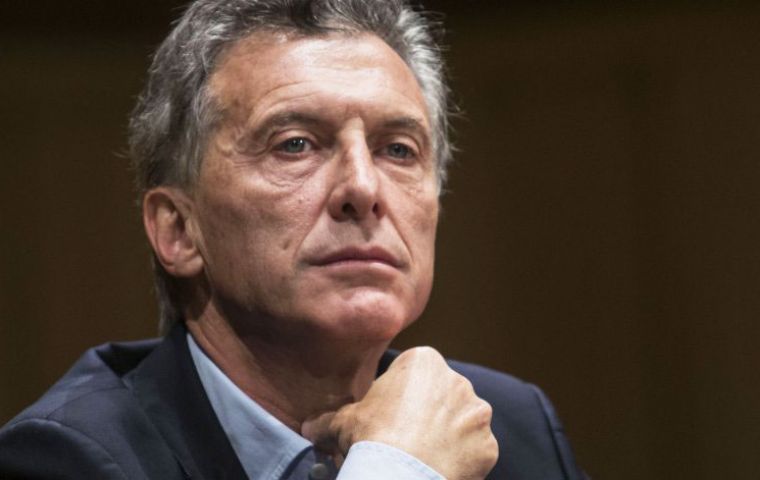MercoPress. South Atlantic News Agency
Macri with The Washington Post “things are not going to change overnight.”
 “At some moment the Argentine people decided to change and move forward, and loosen the ties with our past to better our future”.
“At some moment the Argentine people decided to change and move forward, and loosen the ties with our past to better our future”.  ”I am ready for a long-term, mature relationship that is productive for both of us. We want to be part of the 21st century. There is no room for isolation. . .
”I am ready for a long-term, mature relationship that is productive for both of us. We want to be part of the 21st century. There is no room for isolation. . .  On support for Lilian Tintori, “Venezuela always cared for our human rights. So I am doing exactly what they have done in the past for us”.
On support for Lilian Tintori, “Venezuela always cared for our human rights. So I am doing exactly what they have done in the past for us”. Argentine President Mauricio Macri spoke with The Washington Post’sOn support for Lilian Tintori, “Venezuela always cared for our human rights. So I am doing exactly what they have done in the past for us”.in his office in the Casa Rosada, Argentina’s White House, about the economy, Venezuela and alleged Iranian terrorists in Buenos Aires. Edited excerpts follow.
Many people thought you were not going to win the election in November against the Kirchners’ handpicked successor.
“We made possible what was really impossible. At some moment the Argentine people decided to change and move forward, and loosen the ties with our past to better our future”.
Does that mean no more of the Kirchners? It seems like they left you in a difficult situation.
“Yes, unfortunately they succeeded in isolating Argentina. But the Argentines have decided that this is the time to move forward. In addition to incredible natural resources, we have unique human resources. Even if what we have inherited from the past government is not the best scenario, it will not stop us from developing the country and fulfilling my principal commitments”.
Is your government stuck with a lot of the debts accrued by the Kirchner government? I heard they left bills for the advertisements they ran attacking you during the campaign?
“Yes, hundreds of millions. It’s pretty incredible. TV, newspapers and radio”.
You have already lifted a lot of controls on exports.
“Exports, imports, outflows, inflows - we have unified the exchange rate”.
You let the peso float against the dollar, and it devalued by 30 percent. People were apprehensive about that.
“They were afraid it would cause a worse crisis than the one we were suffering. But I was sure that our problem wasn’t the exchange rate. Our problem is trying to reduce inflation. My main commitment that I assumed during the campaign is to gain a country with zero poverty”.
You lifted foreign exchange controls so one can take dollars out of the country. You have also attacked subsidies?
“Yes, keeping the electricity subsidies for lower-class people and reducing them for the other social levels”.
What do you plan to do next?
”We are trying to solve all the conflicts that we inherited with the world — starting with the holdouts (among the US hedge funds mulling the bond deal). I am quite optimistic. We have already reached an agreement with some of them, and we expect to reach a reasonable agreement with all of them in the next couple of weeks“.
Do you think you’ll reach an agreement with the founder and CEO of Elliott Management, Paul Singer, whose firm is one of the remaining holdouts?
”Yes, we have an open and fair attitude to a final agreement; that is what we have already expressed to the mediator (Daniel Pollack) named by the judge (Thomas Griesa)“.
You need to get inflation under control.
”Yes. . . . The origin of this inflation is that we had a government that, even though it increased taxes, still accumulated increasing deficits. We are committed to reducing our expenses so as to keep reducing inflation. We expect to come back to single-digit inflation in less than three years“.
What is the inflation rate now?
”Now it is at 28 or 30%“.
Since 2005, when US President George W. Bush came to the Summit of the Americas in Argentina and there were riots against him and the United States, no US official has set foot in Argentina. President Cristina Fernández’ government was widely viewed as anti-American. Is this a new era in Argentina-US relations?
”That is right. I am ready for a long-term, mature relationship that is productive for both of us. We want to be part of the 21st century. There is no room for isolation. . . . The only people who were damaged were Argentines. (The day after this interview, US President Obama announced that he will visit the country in March.)“
On your election night, you had Lilian Tintori, the wife of Venezuelan opposition leader Leopoldo López, onstage with you.
”In the tough moments that we suffered under the military government here, we had many refugees from Argentina going to live in Venezuela. Venezuela always cared for our human rights. So I am doing exactly what they have done in the past for us“.
People were impressed, thinking at last someone in Latin America is speaking out to defend human rights in Venezuela. Are you willing to be the new voice who speaks out for human rights in Venezuela?
”I am ready to be the voice to defend human rights in the whole world. Argentina wants to be part of the nations that are battling against terrorism and drug-trafficking and defending human rights and democracy“.
You made drug-trafficking a priority in your campaign. A lot of drugs transit through Argentina to Europe. Reportedly, some drug-traffic proceeds go to fund the Islamic State and Boko Haram. What can you do to curb the growing drug trade in Argentina?
”First, we have to recognize we have a problem. The last government always denied that we were having a huge increase in drug-trafficking in Argentina. Now we are starting to work seriously on the matter, purchasing radar to control our frontiers. But things are not going to change overnight“.
The previous government refused to acknowledge it existed?
”They did the same thing with inflation. They fired the experts who worked at the National Bureau of Statistics and started to declare what they wanted, not what was really going on. Now we are committed to work with the truth. Ruling a country means that you have to be committed to the truth“.
You have a minority in the National Congress, and of course you need to pass laws. But so far you seem to have been successful in reaching out to and making alliances with parts of the opposition.
”In Argentina we are changing to a whole new generation of politicians. They share my idea that Argentina has to be part of the 21st century and has to have an important role in Latin America and the world. Under my agenda of zero poverty and improving the quality of our democracy, many leaders of the opposition are willing to work together“.
You rescinded a deal that the Kirchnerite government made with Iran to jointly investigate the terrorist attack on a Jewish centre in 1994, which Iran is accused of having sponsored. Do you have a plan to seek justice for the death of prosecutor Alberto Nisman, who was about to testify about Iran’s involvement when he died under mysterious circumstances?
”Both subjects are related. The prosecutor was denouncing the president and her cabinet, saying this (agreement) was illegal. Suddenly, a couple of days after this, Nisman was found dead. So now we have to solve both questions — was Nisman right to denounce the deal? Second, why is Nisman dead? His family and others are saying he was murdered. So we need to know the truth. Again, for me, ruling a country is saying the truth“.
How does the Chinese slowdown impact Argentina?
”It affects everybody in the world. But the prices we get, especially for our agribusiness produce, are good“.
The CFK government depended on China a lot.
”Yes, but they didn’t build up a long-term relationship. China was a way to solve short-term problems (with currency swaps). My idea is to transform this relationship in a strategic way. We need to export more value-added products to China, not only commodities. And we can buy from them some of the infrastructure we need.”
Source: Washington Post




Top Comments
Disclaimer & comment rules-

-

-

Read all commentsThis guy keeps impressing me.
Feb 22nd, 2016 - 10:00 am 0Argentina is due an intelligent leader. It has one but will it take advantage of it?
“Im ready to be the VOICE of H.R. in the WORLD” (sic sic)
Feb 22nd, 2016 - 12:46 pm 0Isnt too much. Well in the world maybe, not in Arg, because here no one remembers him denouncing nothing.
He should win the peace nobel prize anyway.
V. B. (its nicer than the way you called our other president TMBOA) very beautiful continues talking with 2 words, pobreza cero (2), combatir narcos (2) and VB (2).
Completely disagree on the drug problem.
Feb 22nd, 2016 - 12:51 pm 0It is not MY problem if EUians, NorthAmoans, Jappers, Chinasians, Ozzers, Chilis, and Brazzos are JUNKIES. We should not spend a cent trying to stop their addiction when they themselves are good for nothing and useless in resolving their own problem.
Which “developed” country has won the war on drugs? ONE? Failures the lot of them, but then whine because in Latin America we can't do the job for them.
It's like trying to stop people from driving cars, and the solution is to try to destroy the pipelines... someone else will find a way to supply the gasoline, and as long as the root of the problem isn't addressed, DEMAND, no final solution will arise.
We should only spend money on drug trafficking when they commit crimes within Argentina... transit, then whatever. Let them.
Commenting for this story is now closed.
If you have a Facebook account, become a fan and comment on our Facebook Page!